This article was co-authored by Pippa Elliott, MRCVS. Dr. Elliott, BVMS, MRCVS is a veterinarian with over 30 years of experience in veterinary surgery and companion animal practice. She graduated from the University of Glasgow in 1987 with a degree in veterinary medicine and surgery. She has worked at the same animal clinic in her hometown for over 20 years.
There are 9 references cited in this article, which can be found at the bottom of the page.
wikiHow marks an article as reader-approved once it receives enough positive feedback. In this case, 95% of readers who voted found the article helpful, earning it our reader-approved status.
This article has been viewed 42,922 times.
Roundworms (Toxocara canis) are a common intestinal worm in dogs, especially in young puppies.[1] A puppy can be born infected if its mother has a roundworm infection, due to worm larvae (an early developmental stage) migrating through her placenta or ending up in her milk.[2] Some clinical signs are common with roundworms, but a veterinarian must confirm a roundworm diagnosis. Although roundworms can make a dog feel and look lousy, roundworm infections are easily treatable and preventable.
Steps
Recognizing the Signs of a Roundworm Infection
-
1Look at your dog’s appearance. Not all dogs show outward signs of a roundworm infection. If you have a puppy that is showing clinical signs, he will have a potbelly.[3] In addition, your puppy’s coat may look dull, and he may not be growing and putting on weight as he should. He will be smaller than what he should be for his age.
- The potbelly appearance is due to the large number of adult roundworms in your dog's belly.
-
2Identify signs of digestive upset. When roundworms find their way to the intestine, they feed off of partially digested food. This robs your dog of vital nutrients and causes him to experience digestive upset, including vomiting and chronic diarrhea. You may be able to see worms in the vomit.[4]
- Puppies that are four to six months old and have heavy roundworm infections may vomit large worms that are still alive, which could be very distressing to you. The roundworms will be an off white color. With early diagnosis and proper treatment, it is unlikely for your puppy to have such a severe infection.
- The vomiting is due to the adult roundworms irritating the lining of your dog’s stomach.
- Call your veterinarian if you see live worms and are unsure how to dispose of them.
- The chronic diarrhea may cause your dog to eliminate more often in the house, which would leave worm eggs in your home and potentially expose other pets, or re-expose him, to infection.
- With the digestive upset, your dog will eat less.
Advertisement -
3Look for signs of respiratory problems. In the complicated life cycle of roundworms, the larvae will migrate up to your dog's lungs, which will cause him to cough. The coughing action moves the larvae into your dog's throat, causing your dog to swallow the larvae.[5] If your dog has a severe roundworm infestation, the larvae in the lungs could give your dog pneumonia.
- Signs of pneumonia include difficulty breathing, a deep cough, and lethargy.[6]
-
4Examine your dog’s feces. Looking at your dog’s feces isn’t exactly enjoyable, but it could help you determine if your dog has roundworms. Adult roundworms are three to four inches long and look like spaghetti.[7] The larvae would likely be too small for you to see with the naked eye, and the eggs would not be detectable at all.
- If you see adult worms, you may want to place a small sample in a tightly sealed plastic bag and take it with you when you take your dog to the veterinarian.
- Wear gloves when you collect the sample and wash your hands thoroughly afterwards.
- Roundworms are usually found in the feces.[8]
Getting a Veterinary Diagnosis of Roundworms
-
1Take your dog to your veterinarian. As soon as your dog is showing signs of a roundworm infestation, schedule an appointment with your veterinarian.[9] A potbellied appearance will be the most obvious sign of roundworms, so schedule the appointment when you see the potbelly. Your veterinarian will be able to confirm the diagnosis.
- If your dog defecates outside of your veterinarian's office, pick up and discard the feces immediately to prevent infecting other dogs.
-
2Bring a sample of your dog’s feces. Your veterinarian will be able to definitively diagnose a roundworm infection by examining your dog’s feces under a microscope. If you were not able to collect a fecal sample at home, your veterinarian will take a sample during the appointment. Since a single adult worm can produce up to 85,000 eggs per day, a small sample of fecal material should be sufficient to identify roundworms microscopically.
-
3Allow your veterinarian to examine the fecal sample. Your veterinarian will prepare a fecal solution (also called a ‘fecal flotation’) that will make it easier to detect the roundworm eggs. Under the microscope, roundworm eggs will be large and stout looking. Roundworm eggs have a very characteristic appearance, so it is unlikely to mistake them for another type of worm egg.[10]
-
4Learn about the limitations of fecal examinations. Although fecal examinations are the primary way to detect roundworms, they are not foolproof. A dog with a roundworm infection does not continuously shed roundworm eggs, so a single fecal sample may not contain any eggs. In addition, if the sample has only a small number eggs, those eggs may not be detectable. Even if no eggs are detected, your veterinarian may still diagnose a roundworm infection, especially if your dog is a puppy and is showing other clinical signs of infection.
Treating Roundworms
-
1Treat your dog with a deworming agent. If your veterinarian diagnoses your dog with roundworms, he or she will prescribe a medication to kill the roundworms. There are many available deworming agents (e.g., fenbendazole, piperazine, ivermectin), so your veterinarian will choose the medication and dosage that will work best for your dog. If you have a very young puppy, he will need to be treated every two weeks until he is two months old, and then monthly until he is six months old.[11]
- Although unpleasant, you may see dead or dying roundworms in your puppy’s feces.
- If you have the puppy’s mom at home, she will need to be treated at the same time as the puppy. This will kill any larvae that may migrate to her milk and cause the puppy to be re-infected.
- Follow the prescribing instructions carefully to ensure effective treatment.
-
2Schedule follow up appointments with your veterinarian. After your dog finishes the treatment, your veterinarian will probably want to test his feces several more times to confirm successful treatment. Your veterinarian will determine when those follow up appointments should take place.
-
3Understand how a deworming agent works. During the complicated life cycle of roundworms, the eggs will develop into larvae that essentially entomb themselves into different body tissues. After a while, they emerge, migrate through the body, and develop into adult roundworms. The deworming agent will kill the adult roundworms. However, since the larvae will be emerging and developing at different times, the medication needs to be given every few weeks to kill all of the adult roundworms.[12]
Preventing Roundworm Infections
-
1Give your dog a monthly preventative. All dogs need a monthly roundworm preventative, especially those who have had roundworms. Roundworm preventatives are often combined with heartworm preventatives to make it easy for dog owners to protect their dogs from disease. Since roundworm eggs are very hardy and can remain in the environment for a long time, do not stop administering the preventative when it gets cold outside.[13]
- Even with a monthly preventative, you should have your dog screened for roundworms once or twice a year after his first year of life.
-
2Pick up your dog’s feces promptly. Roundworm eggs are resistant to disinfectants or any other products you may put in your grass to try to kill them. To keep the eggs from staying in the environment and possibly re-infecting your dog, pick up and throw away your dog’s feces immediately. Children are especially susceptible to roundworm infections, so pick up your dog’s feces if he goes to the bathroom in a playground or around sandboxes where children play.[14]
- Roundworm eggs become infective after one to three weeks of being in the environment.
-
3Practice strict hygiene. Roundworms are a public health issue since they can cause disease (visceral larval migrans and ocular larval migrans) in humans. These diseases are rare but can be serious. If you have children, make sure they wash their hands frequently and properly.[15]
- Wash your own hands frequently and properly as well since you are most likely the one who is picking up your dog’s feces.
-
4Keep your children away from your dog's feces. When your children play outside, keep them from areas where your dog or other dogs normally defecate. If they do play in an area where dogs frequent, make sure they wash their hands when they come back inside and before they handle food.[16] While they are outside, do not let them put their hands by their mouths since this could cause them to swallow roundworm eggs.
Warnings
- Roundworm infections in neonatal puppies can cause severe illness and may be fatal.⧼thumbs_response⧽
References
- ↑ http://www.merckvetmanual.com/mvm/digestive_system/gastrointestinal_parasites_of_small_animals/roundworms_in_small_animals.html
- ↑ https://vcahospitals.com/know-your-pet/roundworm-infection-in-dogs
- ↑ https://www.petsandparasites.org/dog-owners/roundworms/
- ↑ https://www.petmd.com/dog/conditions/infectious-parasitic/c_multi_ascariasis
- ↑ https://www.akc.org/expert-advice/health/roundworms-in-dogs-symptoms-treatment-and-prevention/
- ↑ http://www.merckvetmanual.com/pethealth/dog_disorders_and_diseases/lung_and_airway_disorders_of_dogs/pneumonia_in_dogs.html
- ↑ https://www.akc.org/expert-advice/health/roundworms-in-dogs-symptoms-treatment-and-prevention/
- ↑ http://www.merckvetmanual.com/mvm/digestive_system/gastrointestinal_parasites_of_small_animals/roundworms_in_small_animals.html
- ↑ http://www.vcahospitals.com/main/pet-health-information/article/animal-health/roundworm-infection-in-dogs/899
- ↑ https://www.akc.org/expert-advice/health/roundworms-in-dogs-symptoms-treatment-and-prevention/
- ↑ https://vcahospitals.com/know-your-pet/roundworm-infection-in-dogs
- ↑ http://www.peteducation.com/article.cfm?c=2+2090&aid=762
- ↑ http://www.vcahospitals.com/main/pet-health-information/article/animal-health/roundworm-infection-in-dogs/899
- ↑ https://www.akc.org/expert-advice/health/roundworms-in-dogs-symptoms-treatment-and-prevention/
- ↑ https://www.petsandparasites.org/dog-owners/roundworms/
- ↑ https://www.urmc.rochester.edu/Encyclopedia/Content.aspx?ContentTypeID=160&ContentID=54
- ↑ http://www.merckvetmanual.com/mvm/digestive_system/gastrointestinal_parasites_of_small_animals/roundworms_in_small_animals.html
About This Article
To diagnose roundworms in dogs, monitor your dog for common symptoms of roundworms, like vomiting, chronic diarrhea, coughing, and a dull coat. Your dog might also have a potbelly from worms in its stomach. You should also examine your dog's stool to see if it has thin, 3-4 inch long worms in it, which could be roundworms. If you think your dog has roundworms, bring it to see a vet so they can confirm the diagnosis and prescribe medication to kill the worms. For more tips from our Veterinary co-author, like how to prevent roundworms in dogs, read on!
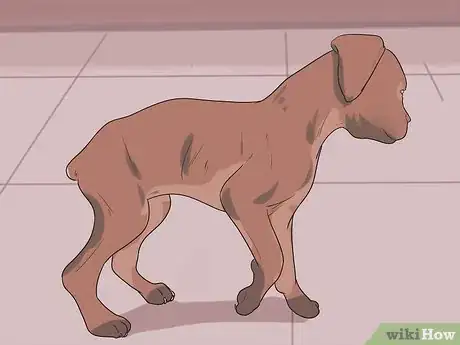
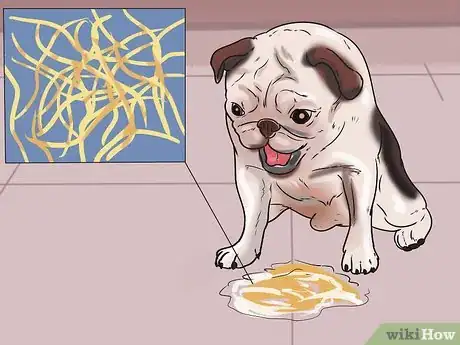
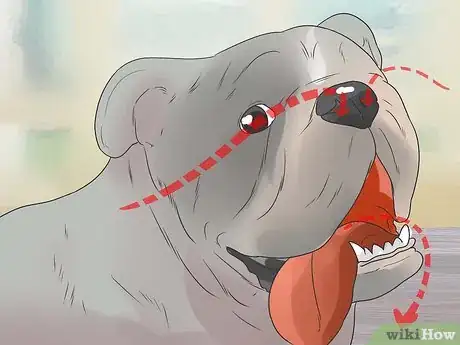
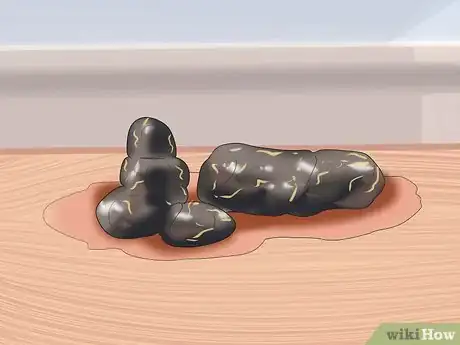
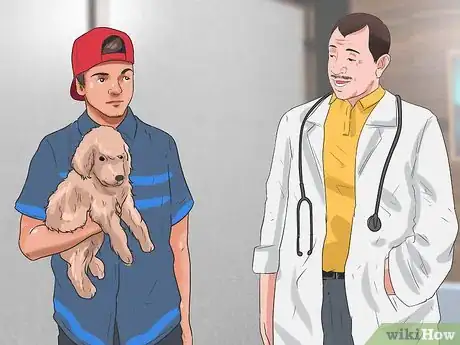
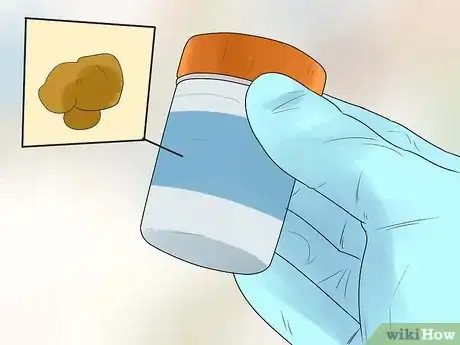
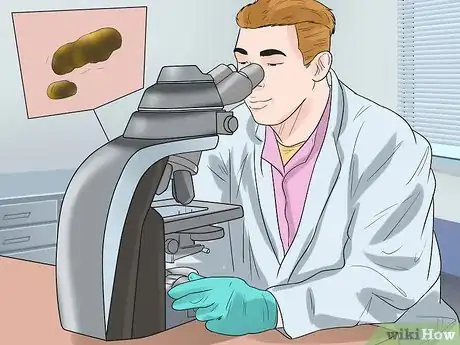
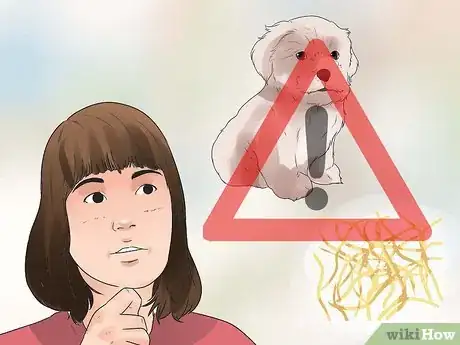
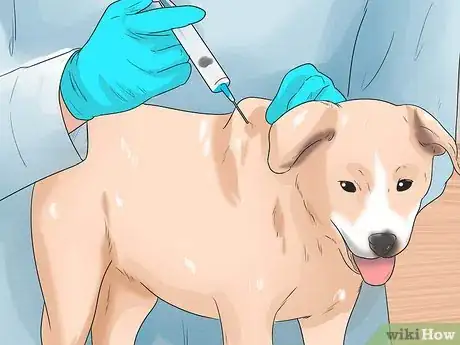
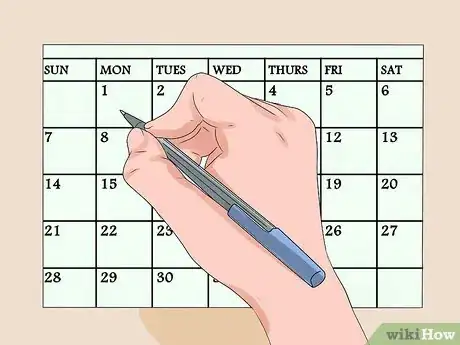
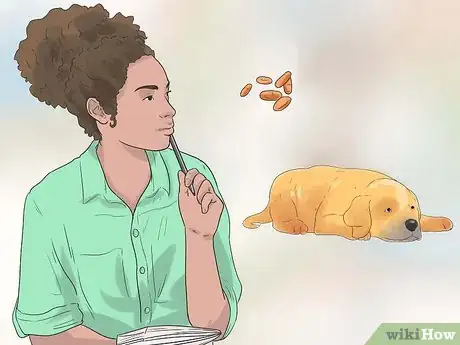
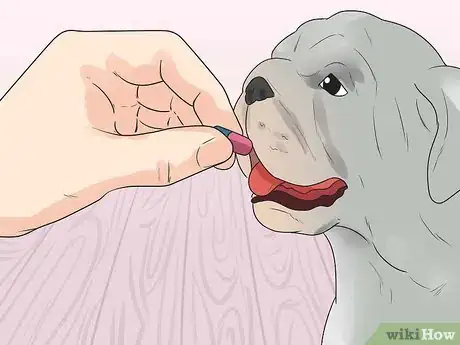
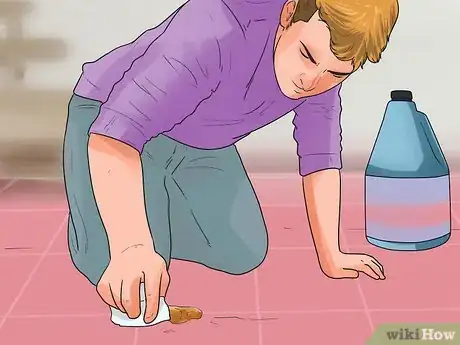
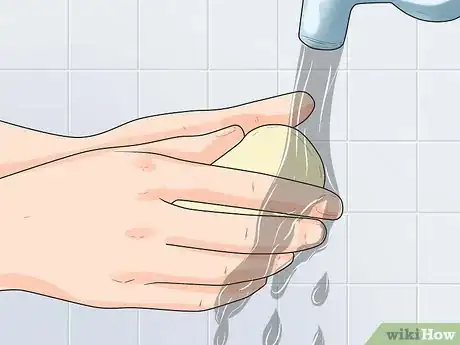
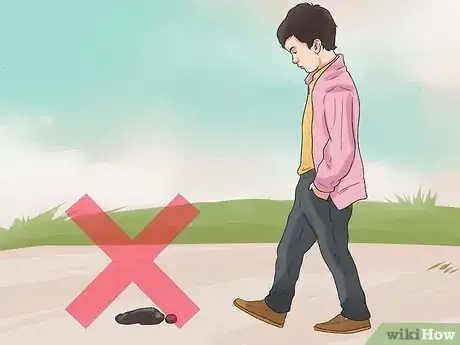
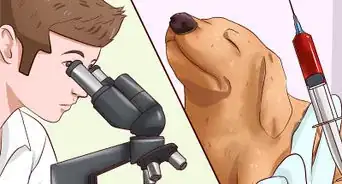
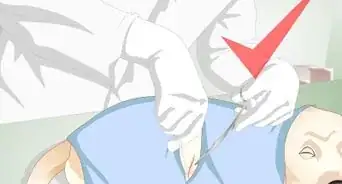
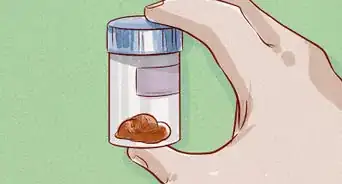

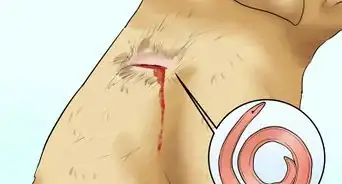
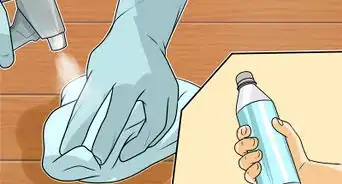
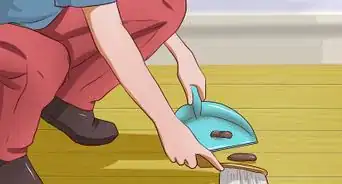
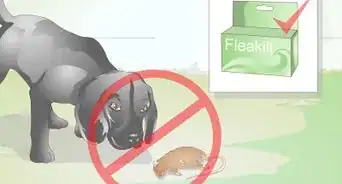
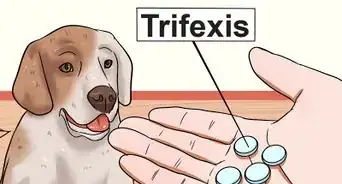










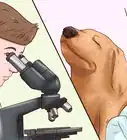
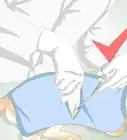
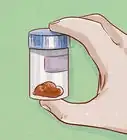
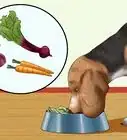



































Medical Disclaimer
The content of this article is not intended to be a substitute for professional medical advice, examination, diagnosis, or treatment. You should always contact your doctor or other qualified healthcare professional before starting, changing, or stopping any kind of health treatment.
Read More...